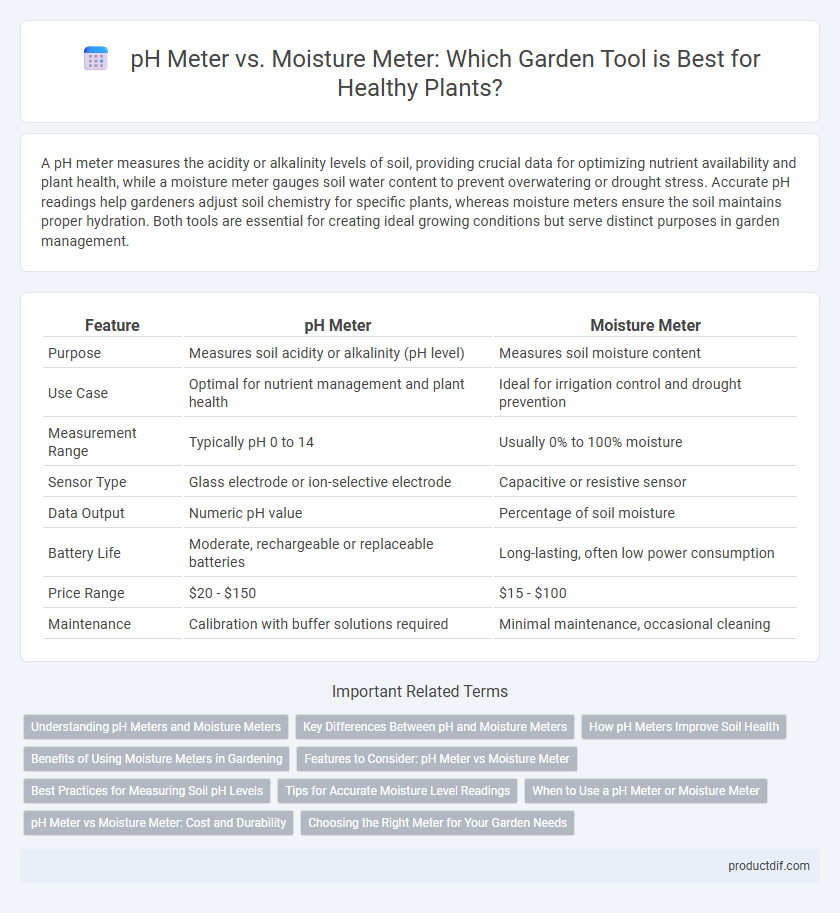A pH meter measures the acidity or alkalinity levels of soil, providing crucial data for optimizing nutrient availability and plant health, while a moisture meter gauges soil water content to prevent overwatering or drought stress. Accurate pH readings help gardeners adjust soil chemistry for specific plants, whereas moisture meters ensure the soil maintains proper hydration. Both tools are essential for creating ideal growing conditions but serve distinct purposes in garden management.
Table of Comparison
| Feature | pH Meter | Moisture Meter |
|---|---|---|
| Purpose | Measures soil acidity or alkalinity (pH level) | Measures soil moisture content |
| Use Case | Optimal for nutrient management and plant health | Ideal for irrigation control and drought prevention |
| Measurement Range | Typically pH 0 to 14 | Usually 0% to 100% moisture |
| Sensor Type | Glass electrode or ion-selective electrode | Capacitive or resistive sensor |
| Data Output | Numeric pH value | Percentage of soil moisture |
| Battery Life | Moderate, rechargeable or replaceable batteries | Long-lasting, often low power consumption |
| Price Range | $20 - $150 | $15 - $100 |
| Maintenance | Calibration with buffer solutions required | Minimal maintenance, occasional cleaning |
Understanding pH Meters and Moisture Meters
pH meters measure the acidity or alkalinity of soil, crucial for optimizing nutrient availability and plant health, while moisture meters assess soil water content to prevent overwatering or drought stress. Accurate pH readings help gardeners adjust soil amendments like lime or sulfur, ensuring ideal growing conditions, whereas moisture meters guide irrigation by providing real-time soil moisture levels. Both tools enhance precise garden management through targeted soil analysis, promoting healthier growth and higher yields.
Key Differences Between pH and Moisture Meters
pH meters measure the acidity or alkalinity of soil, providing critical data for nutrient availability and plant health, while moisture meters assess soil water content to prevent overwatering or underwatering. The key difference lies in their sensing technology: pH meters use electrodes to detect hydrogen ion concentration, whereas moisture meters use probes or sensors to gauge electrical conductivity or dielectric permittivity related to water levels. Understanding these distinctions helps gardeners optimize soil conditions for optimal plant growth and yield.
How pH Meters Improve Soil Health
pH meters provide precise measurements of soil acidity or alkalinity, enabling gardeners to adjust soil conditions for optimal nutrient availability and plant growth. By monitoring soil pH, these devices help prevent nutrient lockout, improve microbial activity, and enhance overall soil health. Using a pH meter allows for targeted amendments like lime or sulfur, ensuring a balanced environment that supports robust root development and higher crop yields.
Benefits of Using Moisture Meters in Gardening
Moisture meters provide accurate soil moisture readings, preventing overwatering and promoting healthy plant growth by maintaining optimal hydration levels. They help gardeners save water and reduce the risk of root diseases caused by excess moisture. Unlike pH meters that measure soil acidity, moisture meters directly monitor soil water content, making them essential for effective irrigation management.
Features to Consider: pH Meter vs Moisture Meter
When selecting between a pH meter and a moisture meter for garden supply, consider accuracy, sensor type, and ease of calibration. pH meters measure soil acidity or alkalinity, essential for nutrient availability, and typically feature digital displays and replaceable electrodes. Moisture meters gauge soil water content using probes, often with analog or digital readouts, prioritizing sensitivity and probe length for different soil depths.
Best Practices for Measuring Soil pH Levels
Using a pH meter provides accurate and immediate readings essential for optimizing soil acidity and alkalinity, which directly influences nutrient availability and plant health. Moisture meters, while valuable for irrigation management, do not measure pH levels and should be supplemented with a reliable pH meter to maintain optimal soil conditions. Regular calibration of the pH meter and sampling soil from multiple locations at consistent depths ensure precise and representative pH measurements for effective garden management.
Tips for Accurate Moisture Level Readings
For accurate moisture level readings, insert the probe of the moisture meter deeply into the soil to avoid surface-level moisture interference. Regularly calibrate the device following the manufacturer's guidelines to maintain precision. Keep the meter clean and dry between uses to prevent faulty readings caused by residual dirt or moisture.
When to Use a pH Meter or Moisture Meter
Use a pH meter to measure soil acidity or alkalinity, which is crucial for adjusting nutrient availability and optimizing plant growth. A moisture meter is essential for determining soil water content to prevent overwatering or underwatering, ensuring healthy root development. Select a pH meter when soil chemistry management is vital, and a moisture meter when precise irrigation control is needed.
pH Meter vs Moisture Meter: Cost and Durability
A pH meter generally costs more than a moisture meter due to its advanced sensor technology and calibration requirements, but it provides precise soil acidity readings essential for optimal plant health. Moisture meters are typically more affordable and durable, constructed with fewer electronic components, making them less prone to damage in outdoor garden environments. Investing in a pH meter supports long-term soil management accuracy, while moisture meters offer cost-effective, rugged solutions for routine watering assessments.
Choosing the Right Meter for Your Garden Needs
Selecting the ideal meter for your garden depends on the specific parameters you need to measure; a pH meter accurately gauges soil acidity or alkalinity, crucial for nutrient availability, while a moisture meter measures soil water content to prevent both overwatering and drought stress. For plants sensitive to pH levels, such as blueberries and azaleas, a reliable pH meter helps maintain optimal growth conditions, whereas a moisture meter benefits gardeners managing irrigation schedules efficiently. Investing in a quality meter tailored to your garden's soil composition and plant types ensures healthier plants and improved crop yields.
pH meter vs Moisture meter Infographic

 productdif.com
productdif.com